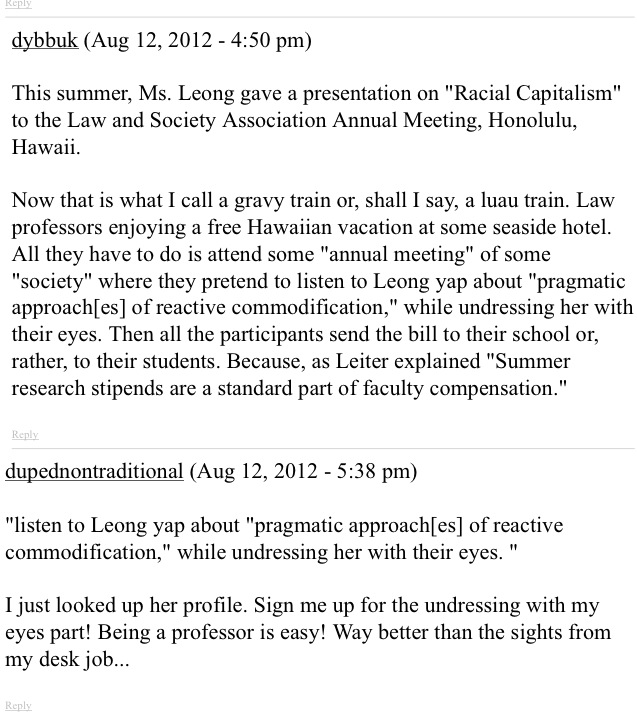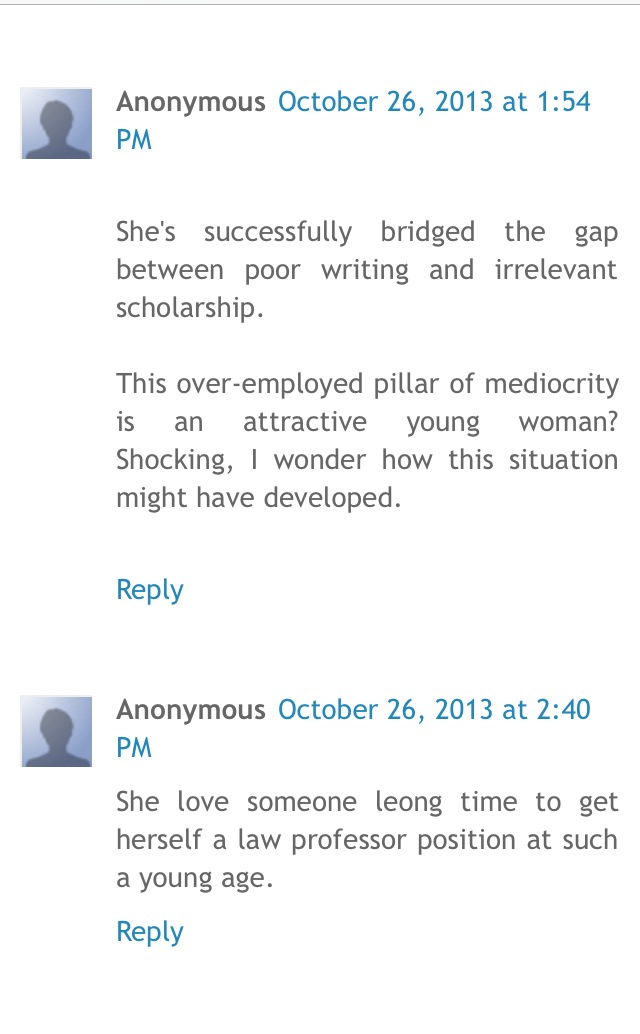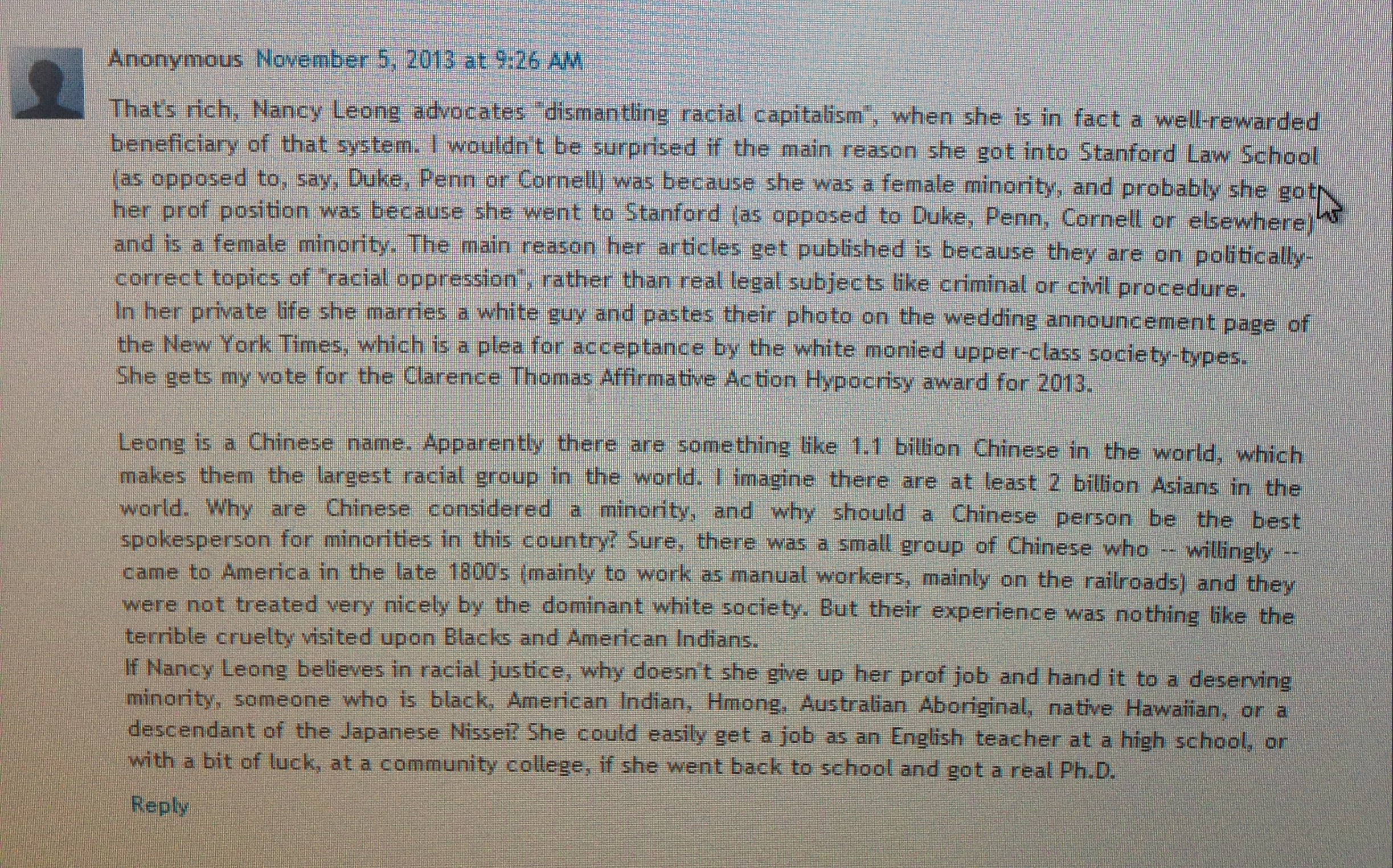This is the first in a series of four blog posts that discuss discrimination and harassment in cyberspace, its perpetrators, and its consequences.
Women and people of color are under-represented in online discourse. As of August 2013, 87% of Wikipedia contributors were men. Women are under-represented on the opinion pages of major news sources, and the number of people of color who write for newspapers is both low and declining. Across disciplines, the most well-known bloggers are predominantly men. The Freakonomics website notes that women economists rarely blog. Closer to home, the regular contributors to many well-regarded group law blogs, such as the Volokh Conspiracy and PrawfsBlawg, are predominantly white men. Why does this racial and gender disparity in online discourse exist?
One reason for the disparity is race- and gender-based online harassment. Many outstanding scholars have already addressed this phenomenon. One example is Danielle Citron’s influential article “Cyber Civil Rights.” My intention with this series of posts is not to break new theoretical ground. Rather, I’m writing because it’s worth reiterating that such harassment is a serious social problem that deserves attention. In particular, I want to look closely at the technology of race- and gender-based harassment — that is, the way that internet harassers focus on identity rather than on ideas as a specific strategy for excluding women and people of color from online discourse.
Rather than draw additional and perhaps unwanted attention to the harassment of other people, I am going to use as examples things that people have said about me. I write about race and gender discrimination (among other things). A while ago I wrote an article called “Racial Capitalism” that was published in the Harvard Law Review. It’s a controversial article. A lot of people disagree with some of it or all of it. And that’s fine. I’m glad that the article prompted discussion of important issues. I’ve enjoyed participating in some of the discussions. For example, Richard Ford wrote a response to “Racial Capitalism” that appeared in the Harvard Law Review’s online forum (short version: he’s skeptical). Then I wrote a reply to his response, which is available here and will soon appear in the Harvard online forum as well. Other discussions were more informal. For example, just a few days ago, the author of the very interesting Opus Publicum blog, who writes about religion, law, politics, and various other topics under the name Modestinus, wrote a brief review (short version: he’s skeptical). I offered a few thoughts in the comments and he responded.
These are examples of different situations in which I was glad to engage with a thoughtful person who had read my work and taken the time to respond my ideas, regardless of whether that person agreed with me. This is how discourse should take place, both online and offline.
Unfortunately, that kind of discourse is often not the norm for women and people of color in cyberspace. Other responses differ in kind from mere disagreement. The pattern is this: When people don’t like what women and people of color are saying, they express that dislike in gendered and racial terms. Here are some examples* of people responding in this way to “Racial Capitalism” and some of my other articles about race:

This comment reveals an important point about the strategies that some people (usually self-identified men) use to attack women and people of color. Rather than explaining why (for example) he thinks that the racial capitalism framework is analytically flawed, the first commenter disparages my Native Hawaiian background with a reference to the “luau train.” He then attempts to undermine my intellectual contribution to an academic conference by claiming that the reason for my presence is to serve as an object of sexualized attention for a presumed heterosexual male audience. That kind of comment would not be tolerated in any workplace. It’s worth asking — at least as a normative matter, if not a legal one — why the internet should be any different, especially when a lot of us do a substantial portion of our work online and when the racial and gender harassment directly targets our work and our professional identities.
Here are some more comments about me:

Again, notice that rather than engaging in a substantive critique of my ideas, both commenters reflexively attack my identity. The former comment attributes my professional achievements to gendered physical attributes. The implication is that a woman simply could not have earned success through intelligence or hard work. The latter comment—in addition to being defamatory and utterly false—also invokes tired stereotypes about Asian female sexual availability that pervade the media. The latter comment also provides a useful example of the unique harms that women experience in cyberspace. People rarely allege that a man achieved status within his profession by having sex with someone. Successful women hear those accusations all the time.
Here’s yet another:

The phrasing of the post is different than the previous ones, but the strategy is identical. Rather than offering a substantive critique of a person’s ideas, it attempts to diminish that person by reference to identity. Put another way, it disparages my accomplishments by sexualizing them. Moreover, the vulgarity and aggression of this post and others like it is a tactic to exclude women and people of color from discourse. Again, it’s worth asking why, when so many of us do much of our work online, people often shrug their shoulders at a comment that would be grounds for termination in any workplace.
Here’s another, lengthier comment:

This comment provides a particularly useful example of the way that online critics grasp at identity rather than engaging with ideas. First, the commenter replaces substantive critique of my article with a critique rooted in my presumed race and gender. With respect to race, he begins with an entirely unsubstantiated claim that—as a woman of color—I must be a beneficiary of affirmative action. Moreover, he suggests that Chinese people are poor spokespersons for racial justice because they don’t suffer discrimination, seemingly oblivious to both historical and contemporary evidence to the contrary, as well as to the irony that the very existence of his post contradicts his claim. And he concludes with a factually erroneous statement that fails to contemplate the possibility that my background is, in fact, Native Hawaiian. Likewise, the commenter focuses on my personal life—who I marry, the race of my partner—rather than my ideas. In so doing, he invokes well-worn stereotypes about Asians women desiring white men and other indicia of the status associated with whiteness. His response attempts to situate me as women have historically been situated—that is, in relation to men, rather than as autonomous agents.
I could provide literally hundreds of other examples of racial and sexual comments just about myself, although this seems like enough for now. The examples reveal an important phenomenon. Many posters (mostly self-identified men) use identity as a basis for disparaging women and people of color rather than engaging substantively with their arguments. This practice is a thinly-veiled attempt to “put women in their place” or to “put those minorities in their place” by focusing on identity rather than ideas.
I chose to use these examples because they are about me, rather than granting additional exposure to the harassment of someone else. But troubling as these comments are, they are far less so than those directed at many other women and people of color. I am hesitant to draw more attention to incidents that have not already received publicity. But for those who remain unconvinced that this is a widespread phenomenon, Soraya Chemaly has documented many such instances of harassment here, and another recent article provides additional examples.
Why do men, and especially white men, engage in this specific version of hostility and harassment when confronted with the ideas of a woman of color? In many instances I suspect the strategy arises from insecurity triggered by the success of the target of harassment. It’s much easier on the ego to believe that a woman of color is more successful than you because of her identity, rather than her intelligence or her work ethic. And so posters choose to direct attention to identity rather than ideas.
With that said, the anxieties and insecurities of anonymous internet bloggers are considerably less interesting to me than the consequences of the way that these anxieties manifest themselves.
The result of gender and racial harassment is that many women and people of color withdraw from cyberspace. Friends and colleagues have told me that they stopped blogging, or never started, or avoided certain topics, because they felt that they simply could not deal with the online harassment that they would draw. And beyond my own anecdotal evidence, there are many documented instances of women withdrawing from online discourse after identity-based harassment is directed their way.
To be clear, I’m not saying that men never experience identity-based online harassment. Many of them do—particularly men who are (or are presumed to be) members of other disfavored groups, such as poor people or queer people, as well as men who promote unpopular ideas.
My point is simply that online harassment disproportionately affects women and people of color, as well as members of some other groups, and that this phenomenon helps to explain the absence of those groups from online discourse. The loss of such perspectives is a loss to discourse. My point isn’t the essentialist one that women or people of color have any particular perspective. Rather, it’s that women and people of color tend to have different life experiences in a society that’s neither race nor gender blind, and that, in the aggregate, different experiences lead to different perspectives. If we think it is a problem that some perspectives are under-represented in online discourse, a good first step is to do away with the serious obstacles that race- and gender-based harassment create to online participation.
*I have chosen not to link to, or to identify, the sources of these comments because I do not want to drive traffic to websites that tolerate racial and sexual harassment. If you would like more information, please feel free to contact me.
– Nancy Leong


Pingback: Identity and Ideas | Feminist Law Professors | ...
Pingback: Racial Capitalism Redux | Opus Publicum